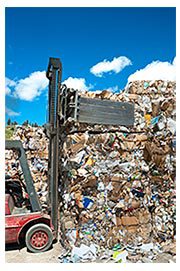
RECYCLING and waste management company SITA UK published a report on 26 February entitled “Mind the Gap”, which presents an assessment of UK residual waste treatment capacity between 2015 and 2025.
The report finds that in 2015, 17.8 million tonnes of residual waste will need to be landfilled or used as refuse derived fuel in other countries, because there is not enough infrastructure capacity in the UK to make use of it domestically.
This report charts the gap between treatment capacity and the volume of UK residual waste up to 2025 – although this gap will narrow and level out at 5.7 million tonnes by 2025 as the volume of residual waste drops against the proportion of materials that have been recycled or avoided altogether.
One of the largest causes of this gap in treatment capacity is a lack of accurate data, which is needed to underpin investment in new facilities. Between 10 and 20 new treatment facilities are required for every million tonnes of waste diverted from landfill. SITA UK estimates that the UK needs to invest up to £25 billion in new treatment infrastructure by 2025/30 if all the waste currently going to landfill is to be diverted and treated.
As there is no central resource for commercial and industrial waste data, the industry has found it difficult to forecast residual waste volumes and plan accordingly.
SITA UK treats residual waste material from millions of households across the country and serves approximately 42,000 industrial and commercial customers. The company says that since it introduced regular on-board weighing to its industrial and commercial customers, the collected data has provided it with an increasingly accurate insight into the nature of commercial and industrial waste generation and composition. And this is useful when attempting to forecast future trends, when allied with available municipal waste data.
The report makes five key recommendations to help deliver enough capacity across an appropriate range of treatment methods.
These include improving data capture of industrial and commercial waste through the adoption of a generic system across industry. And introducing stronger incentives and policies to further increase and maintain higher recycling rates. Government should issue guidance on the best collection techniques to minimise contamination of recyclate streams.
There should also be efforts to integrate energy recovery from waste into UK energy planning to encourage more domestic use of energy-rich waste derived fuels. ·
More also should be done to Incentivise the use of heat produced in energy recovery from waste, says the report.







